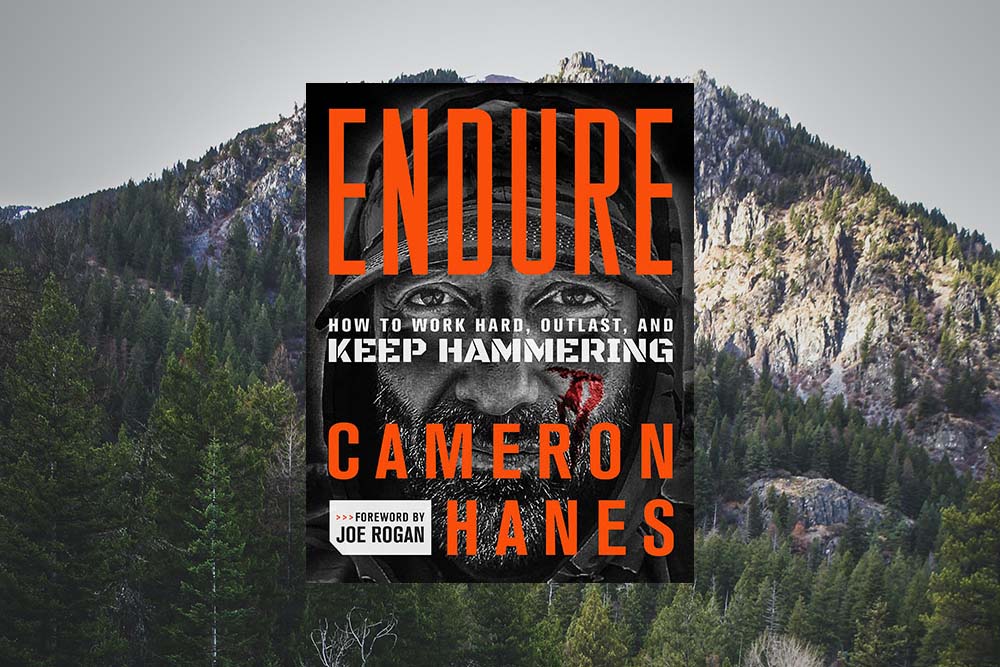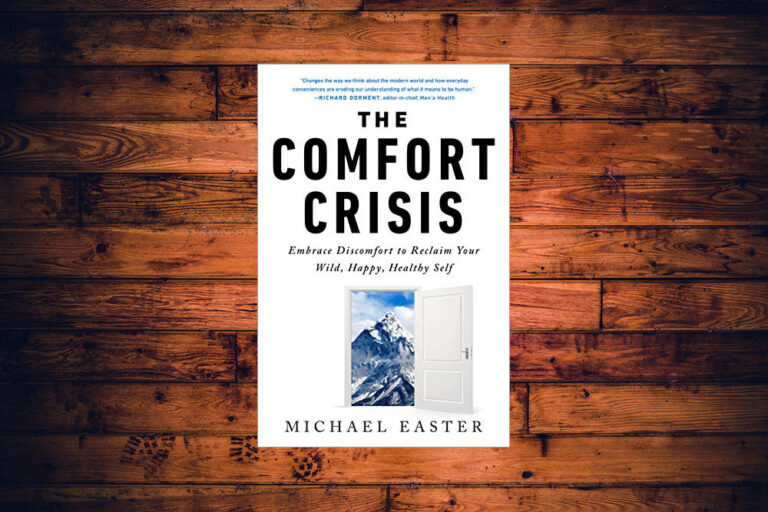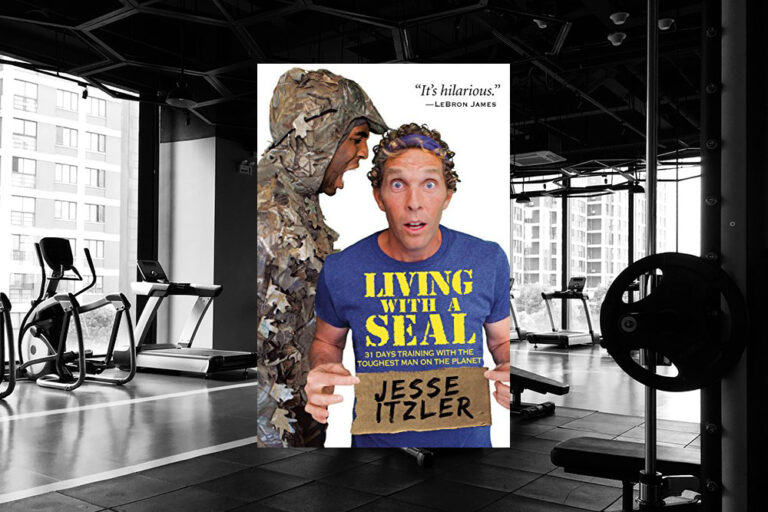#21: How to Do Hard Things and Consistently Get Better. Notes from “Endure” by Cameron Hanes (Part 1)

In his memoir Endure: How to Work Hard, Outlast, and Keep Hammering bowhunter Cameron Hanes shares his secrets to a strong work ethic, enduring hard stuff, and consistently getting better.
David Goggins, Cameron’s friend, describes Cameron in the following way:
My entire life I was obsessed with finding the hardest men that walked this planet Earth. I sought them in the most difficult jobs in the military and the endurance events in which I participated. I had no idea I would come across such a savage due to a chance encounter.
I have trained with many of the toughest and hardest men on the planet and only one stands out. That one is Cameron Hanes.
Joe Rogan, also Cameron’s friend, summarizes Hanes this way:
I read once that if you run a marathon it takes your body six months to fully recover. I don’t know who wrote that, but someone needs to tell that silly bitch that there’s a guy in Oregon with a full-time job with the department of water and power who runs multiple marathons every week. Sometimes he’ll get up at 3:00 a.m. and run a full marathon before work. Then he’ll come home from working eight hours, practice archery, lift weights, and do it all over again the next morning.
He’s run multiple 100-mile races and several over 200 miles. These require days and days of running without rest.
But Cameron’s obsession with physical performance isn’t about fitness in itself. It’s so that he can get better at bowhunting elk in the rugged, remote mountains.
It’s important to emphasize, though, that the book isn’t just for bowhunters. As Cameron describes it:
Regardless of how it may appear, this book isn’t about bowhunting. It’s not an advice book. I don’t tell people what to do, nor do I try to speak for others. I just share what I do and what I’m passionate about, because life without passion is simply existence in my opinion.
We are all hunters in a sense, searching for a more meaningful life. Too many times the weight of this world becomes too heavy to carry through the mountains, so we turn back toward safer, more comfortable conditions. Too often we find ourselves waiting and wondering when success will find us. These pages provide the motivation to keep moving, to stay steadfast, and to be ready for that moment.
I have to admit the read was uncomfortable to me. Most of the book is about bowhunting and the animals Cameron Hanes killed, with lots of photos.
As someone who hasn’t eaten animals my entire adult life (I became vegetarian around 17 years old and vegan when I was 30) it wasn’t easy to set my opinions aside and try to learn from the man.
And yet I learned something. As difficult as it is, we benefit a lot from reading books written by people who have different views than we do.
I don’t agree with everything I read in countless books I study to provide these articles. But ultimately, if you keep learning only from people who are exactly like you, you won’t grow much.
So let’s see what we can learn from Cameron Hanes. In today’s article, we’ll cover how to do hard things, how to get stronger, and how to consistently get better.
Treat Your Life Like a Work of Art
The times we could have done more eat at your self-esteem. They rob you of your self-respect and diminish your belief in your potential.
We’ve all had moments where we could have done more but didn’t.
The true art of a full life is to minimize those moments when your inner bitch wins the battle and maximizes your ability to rise and grind.
There is an art to this.
Unfortunately, most of us don’t treat our lives like a work of art.
The vast majority of us will leave this life like an unfinished canvas—a dim shadow of what we could have been if we had dedicated ourselves to mastering the mind, and consistently forcing the body into action.
The quote comes from the excellent foreword written by Joe Rogan.
When we do hard things, we’re often torn between the need for comfort and the need for growth.
When the need for comfort wins, the relief temporarily makes you feel better—only to make you feel worse later on when you regret you didn’t try to keep going a little longer.
You not only hate yourself in that moment. You also lose self-confidence and fear trying again.
We often use that fear of disappointment as a rationalization why we shouldn’t take on challenges. If we choose to avoid the hard stuff our entire lives, the inevitable outcome is an unfinished canvas: a life ended with regrets and what-ifs.
As you face adversity and feel tempted to surrender, remind yourself that quitting, similar to drugs, makes you feel good only for a brief moment. Later, you pay the price—you lose self-respect and self-confidence.
What to Do If You Can’t Get Started?
I get a lot of people who reach out to me feeling like they can’t get started. For most of them, they can’t get any momentum going. What I tell them is that you just need to get out the door and worry about today only. Don’t worry about tomorrow. Don’t worry about a week from now. You worry about today. Win the day. Do something positive. Worry about tomorrow tomorrow. To me, that is what enduring means. To get some positive direction going. To build up some momentum. What you’re barely doing day one, you’re doing easily on day twenty. That’s how it works. You have to get started and then you have to endure.
Cameron shares a simple, often repeated but often forgotten truth: to get started, you need to focus on building up some momentum, not worrying about the future.
If you worry about tomorrow instead of today, guess what… You’ll worry about tomorrow for the rest of your life until another tomorrow doesn’t come and your work of art is never finished.
A couple of weeks ago I started stretching. Flexibility has always been a big weakness of mine. I started a program that initially requires stretching for 1-2 hours a day until you open up your body.
It would be easy to postpone starting this program, worrying that I wouldn’t be able to find the time to do it consistently. But that’s a sure-fire way to never do anything.
I started it and worried only about the first day. The second day, I only worried about the second day. The third day, I focused on getting the third day done. I’ve been successfully following the program for 4 weeks already.
As Cameron says, you have to get started and then you have to endure, the art of which you learn along the way.
What Do You Learn About Yourself in Dire Situations?
“‘Why run?’ is a question often asked,” Steve Prefontaine once penned in a high school essay. “Why go out there every afternoon and beat out your brains?… What is the logic of punishing yourself each day, of striving to become better, more efficient, tougher?”
This was a question that I would come to ask myself—and come to be asked quite frequently—the older I became. Prefontaine’s answer sums up his legendary mindset.
“The value in it is what you learn about yourself. In this sort of situation all kinds of qualities come out—things that you may not have seen in yourself before.”
This can refer to running a tough race, or it can relate to enduring a terrible childhood. What do you learn about yourself, even in dire situations?
Recently covered Dean Karnazes used similar words when describing why he participates in grueling ultra-marathons. As he wrote:
Running an ultramarathon builds character, but it also exposes it. We learn about ourselves, we gain deeper insights into the nature of our character, and we are transformed by these things. To know thyself one must push thyself.
Cameron Hanes has similar observations, though he applies them not only to voluntary challenges like a race but also to situations beyond our control like a terrible childhood.
We can learn from enduring every dire situation in our life. It doesn’t mean we should wish for terrible things to happen to us. Rather, it’s about finding valuable lessons in them if there’s nothing we can do to remedy them.
I don’t wish a certain personal event of mine on anyone. Yet as painful as it was, it was also one of the most transformational moments of my life.
If I were omnipotent, would I turn back the clock and try to prevent it? Of course I would. But I can’t, so the only thing I can do is to use it to live a better life.
That’s what Cameron Hanes means by enduring: survive the hard times, get better, and keep going.
See It as a Chisel, Not a Crutch
It’s easy to use your childhood as a crutch instead of seeing it as a chisel.
There are a lot of divorces out there, so that means a lot of kids come from broken homes. I always hear people say, “My family is so dysfunctional,” using it as an excuse for something. But it’s not really a valid excuse, because everybody’s family is dysfunctional in some way. There are so many crutches people want to use to justify themselves, but for me, you have to eliminate every single one of them. Get rid of all of them. Then tell yourself it’s up to you. What are you going to do now that you’ve let go of those crutches?
Whether you had a tough childhood, were born in a poor country, lost a loved one when you were young, spent years battling health problems, or otherwise were dealt a bad hand in life, you choose to see it as a crutch or as a chisel.
A divorce and alcoholism have greatly impacted Cameron Hanes’s childhood. He could have used it as an excuse in today’s victim mentality culture and never amounted to anything. But instead, he got rid of his justifications and decided that his life was up to him, not his past circumstances.
What if you drew strength from all the bad things that you survived in the past?
What if you stopped looking at your current adverse circumstances as rationalizations why you can’t do something?
For example, I’m not a native English speaker. I was taught English at school but the level of instruction was laughable. It wasn’t until I was a teenager when I decided to take responsibility for improving my English skills that I finally started learning it properly.
I could have used my status as a non-native speaker as a rationalization why I would never become a good writer in English. Instead, I treated it as a chisel—and keep treating it as a chisel still.
I still write up to a few thousands of words a day. I read up to a few hours a day. I study the English language and try to understand subtleties that native speakers understand instinctively. I even pay for accent classes to change my speaking habits.
I’m still disadvantaged compared to native speakers. But I refuse to use it as a rationalization for not pursuing excellence as a writer.
What could you do if you started looking at your handicaps as your chisels?
Depend on Yourself
Sometimes I hear someone give a familiar excuse when it comes to working out. “Yeah, I was lifting good, hard, in a groove, but then my partner’s work schedule changed, so he couldn’t make it.” What does that have to do with anything? Who cares? It’s not about somebody else. It’s about you.
In a conversation between David Goggins and Joe Rogan, David says that listening to music while working out is cheating.
Setting aside the debate whether it’s cheating or not, one thing is clear: if you need music to pump yourself up to work out hard, you may have a problem. The same thing applies if you need a partner to go to the gym, run, or study.
Why’s that such a big deal?
Because dependencies make us weak and give us handy excuses to back out.
Oh, I don’t have my earphones so I can’t pump myself up for today’s workout.
My partner is not around so I’m not going for that long run today.
It doesn’t mean you shouldn’t have a partner or listen to music every now and then but if you NEED it or you can’t perform, ask yourself what it says about your resolve.
Practice in Suboptimal Conditions
I shoot my bow every day of the year anyway, but I believe the reps that really count are when I shoot after running an ultra or after a tough lifting session, when I am beat down, tired, weak, and mentally exhausted, much like I get on those long mountain hunts. I know if I practice putting the arrow on its mark when feeling like this, I’ll be that much more proficient come crunch time.
This quote makes me think of Ross Edgley’s mention of the Royal Marines who are taught to perform at their best when they feel at their worst.
The workouts or studying sessions that matter the most are often the ones when we feel suboptimal. If you can complete your workout when you’re tired or study a new subject when you’re distracted, it shows your commitment to the goal.
These experiences not only strengthen your mind. They also serve as a real-life practice for when things get tough in even less comfortable circumstances in the future.
For example, if you practice boxing defense drills by the end of the workout, when you’re completely beat down, it’ll help you much more in an actual fight than if you were to only do them when you’re fresh.
If you’re a public speaker, you won’t always be in excellent form on stage. Rehearsing your talks when you’re exhausted will help you deliver a great talk even if you aren’t at your best.
When I do prolonged 40+ hour fasts, I also treat them as an exercise in performing at my best regardless of the circumstances.
The last time I did a 43-hour fast I still did my work and my workouts (four of them to be exact). Skipping food is not an excuse to skip doing hard things.
Whenever you find yourself feeling suboptimal before a difficult practice, remind yourself that these moments count the most. They prepare you to perform at your best when you’re at your worst.
Questions to Ponder
1. Have you ever realized that letting your inner bitch win robs you of self-respect and self-confidence?
2. How often do you postpone action because you’re worrying too much about tomorrow and too little about today?
3. What have you learned recently about yourself as you faced a dire situation?
4. Do you see your past as a crutch or as a chisel?
5. Do you depend on someone or something to do your best?
6. Do you practice your skills when feeling suboptimal?
If you want more advice on how to do hard things and consistently get better, sign up for a free weekly Discomfort Club newsletter. Enter your email address below:




